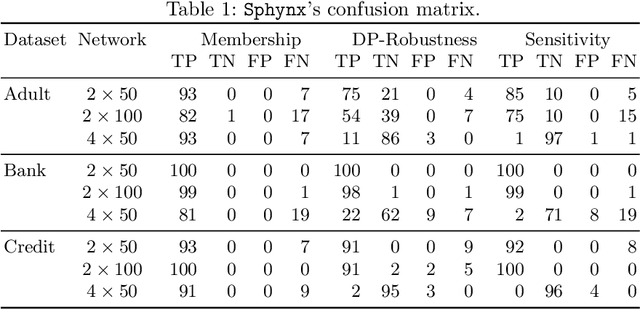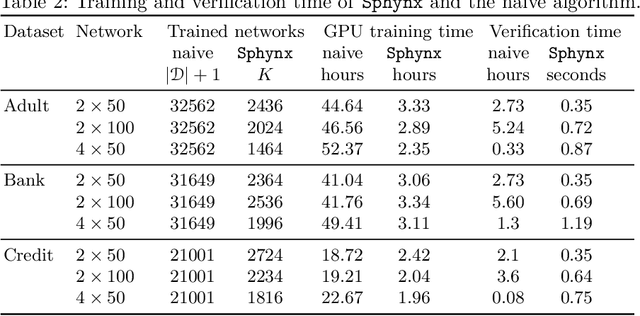Anan Kabaha
Guarding the Privacy of Label-Only Access to Neural Network Classifiers via iDP Verification
Feb 26, 2025



Abstract:Neural networks are susceptible to privacy attacks that can extract private information of the training set. To cope, several training algorithms guarantee differential privacy (DP) by adding noise to their computation. However, DP requires to add noise considering every possible training set. This leads to a significant decrease in the network's accuracy. Individual DP (iDP) restricts DP to a given training set. We observe that some inputs deterministically satisfy iDP without any noise. By identifying them, we can provide iDP label-only access to the network with a minor decrease to its accuracy. However, identifying the inputs that satisfy iDP without any noise is highly challenging. Our key idea is to compute the iDP deterministic bound (iDP-DB), which overapproximates the set of inputs that do not satisfy iDP, and add noise only to their predicted labels. To compute the tightest iDP-DB, which enables to guard the label-only access with minimal accuracy decrease, we propose LUCID, which leverages several formal verification techniques. First, it encodes the problem as a mixed-integer linear program, defined over a network and over every network trained identically but without a unique data point. Second, it abstracts a set of networks using a hyper-network. Third, it eliminates the overapproximation error via a novel branch-and-bound technique. Fourth, it bounds the differences of matching neurons in the network and the hyper-network and employs linear relaxation if they are small. We show that LUCID can provide classifiers with a perfect individuals' privacy guarantee (0-iDP) -- which is infeasible for DP training algorithms -- with an accuracy decrease of 1.4%. For more relaxed $\varepsilon$-iDP guarantees, LUCID has an accuracy decrease of 1.2%. In contrast, existing DP training algorithms reduce the accuracy by 12.7%.
Verification of Neural Networks' Global Robustness
Mar 06, 2024



Abstract:Neural networks are successful in various applications but are also susceptible to adversarial attacks. To show the safety of network classifiers, many verifiers have been introduced to reason about the local robustness of a given input to a given perturbation. While successful, local robustness cannot generalize to unseen inputs. Several works analyze global robustness properties, however, neither can provide a precise guarantee about the cases where a network classifier does not change its classification. In this work, we propose a new global robustness property for classifiers aiming at finding the minimal globally robust bound, which naturally extends the popular local robustness property for classifiers. We introduce VHAGaR, an anytime verifier for computing this bound. VHAGaR relies on three main ideas: encoding the problem as a mixed-integer programming and pruning the search space by identifying dependencies stemming from the perturbation or the network's computation and generalizing adversarial attacks to unknown inputs. We evaluate VHAGaR on several datasets and classifiers and show that, given a three hour timeout, the average gap between the lower and upper bound on the minimal globally robust bound computed by VHAGaR is 1.9, while the gap of an existing global robustness verifier is 154.7. Moreover, VHAGaR is 130.6x faster than this verifier. Our results further indicate that leveraging dependencies and adversarial attacks makes VHAGaR 78.6x faster.
Verification of Neural Networks Local Differential Classification Privacy
Oct 31, 2023



Abstract:Neural networks are susceptible to privacy attacks. To date, no verifier can reason about the privacy of individuals participating in the training set. We propose a new privacy property, called local differential classification privacy (LDCP), extending local robustness to a differential privacy setting suitable for black-box classifiers. Given a neighborhood of inputs, a classifier is LDCP if it classifies all inputs the same regardless of whether it is trained with the full dataset or whether any single entry is omitted. A naive algorithm is highly impractical because it involves training a very large number of networks and verifying local robustness of the given neighborhood separately for every network. We propose Sphynx, an algorithm that computes an abstraction of all networks, with a high probability, from a small set of networks, and verifies LDCP directly on the abstract network. The challenge is twofold: network parameters do not adhere to a known distribution probability, making it difficult to predict an abstraction, and predicting too large abstraction harms the verification. Our key idea is to transform the parameters into a distribution given by KDE, allowing to keep the over-approximation error small. To verify LDCP, we extend a MILP verifier to analyze an abstract network. Experimental results show that by training only 7% of the networks, Sphynx predicts an abstract network obtaining 93% verification accuracy and reducing the analysis time by $1.7\cdot10^4$x.
Boosting Robustness Verification of Semantic Feature Neighborhoods
Sep 12, 2022



Abstract:Deep neural networks have been shown to be vulnerable to adversarial attacks that perturb inputs based on semantic features. Existing robustness analyzers can reason about semantic feature neighborhoods to increase the networks' reliability. However, despite the significant progress in these techniques, they still struggle to scale to deep networks and large neighborhoods. In this work, we introduce VeeP, an active learning approach that splits the verification process into a series of smaller verification steps, each is submitted to an existing robustness analyzer. The key idea is to build on prior steps to predict the next optimal step. The optimal step is predicted by estimating the certification velocity and sensitivity via parametric regression. We evaluate VeeP on MNIST, Fashion-MNIST, CIFAR-10 and ImageNet and show that it can analyze neighborhoods of various features: brightness, contrast, hue, saturation, and lightness. We show that, on average, given a 90 minute timeout, VeeP verifies 96% of the maximally certifiable neighborhoods within 29 minutes, while existing splitting approaches verify, on average, 73% of the maximally certifiable neighborhoods within 58 minutes.
 Add to Chrome
Add to Chrome Add to Firefox
Add to Firefox Add to Edge
Add to Edge